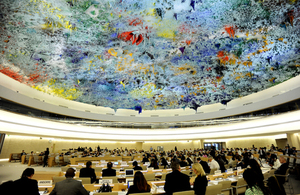Human Rights Council 35: Rule of Law
This joint statement was delivered at the 35th session of the Human Rights Council during the discussion of the rule of Law on 19 June 2017.

The Human Rights Council takes place at the Palais des Nations in Geneva
I have the honour to deliver this statement on behalf of 62 States.
The rule of law is a principle of governance in which all persons, institutions and entities, whether public or private, and including the State itself, are accountable to laws that are publicly promulgated, equally enforced and independently adjudicated, and which reinforce international human rights obligations. It is an over-arching principle.
We recall that as early as 1948, the Universal Declaration of Human Rights proclaimed that “it is essential … that human rights should be protected by the rule of law”. We reaffirm, as we did in the Vienna Declaration and Programme of Action, that this remains as true and relevant today, almost 70 years later, as it was then.
By upholding international human rights principles, the rule of law is key to closing the gap between human rights aspirations and human rights realities, and to promoting and protecting human rights. We see how the rule of law operationalises human rights through constitutional and legal protections of human rights, an independent and impartial judicial system, effective legal remedies, and competent, accountable and inclusive institutions.
The rule of law has a role in preventing violence and in the implementation of the SDGs as well as protecting human rights. We are mindful that societies in which human rights are valued, and people are empowered and listened to, are more likely to be just, fair, stable and free from violence. In this session, which has a particular emphasis on women’s rights, we take the opportunity to stress the importance of the rule of law in enshrining equality before the law, access to justice, and participation in decision making on the basis of equality, thereby empowering the whole of society.